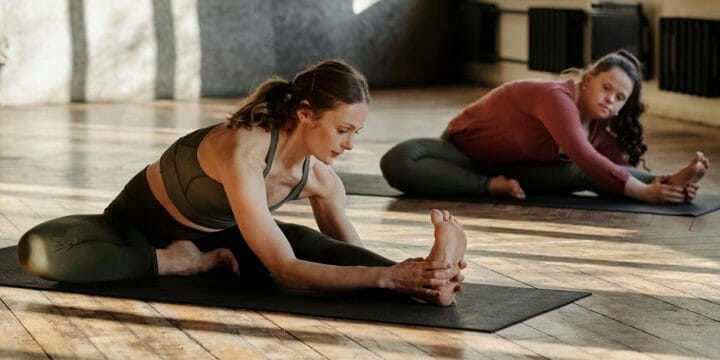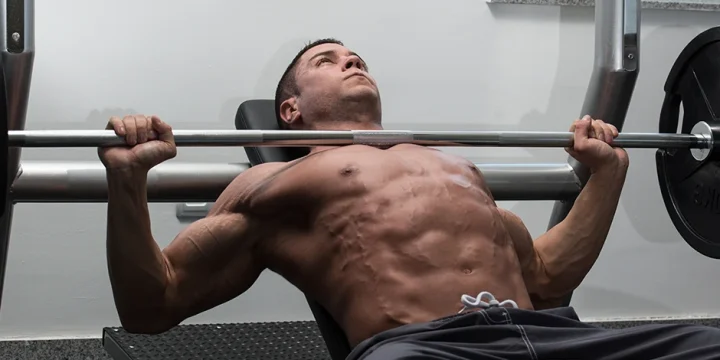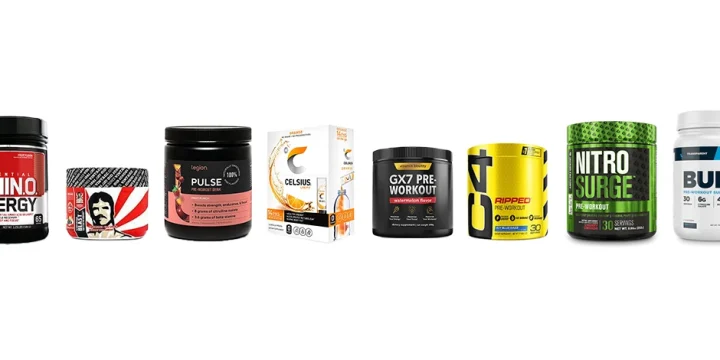One thing the dietary supplement industry will never talk about is how many alternatives there are to getting essential nutrients that boost your performance.
As a personal trainer, I certainly recommend many of these supplements, but I also tell gym goers about the natural alternative like drinking tea.
The problem is that you have to pick the right kind of tea for the specific goals you have in mind. Whether that’s lifting weights or a specific weight loss goal, I’ve researched some great options with my nutritionist.
There’s plenty of scientific evidence, and here’s the summary of our research.
Quick Summary
- The six best pre-workout teas for performance include black tea, green tea, oolong tea, matcha tea, ginger tea, and milk tea.
- Drinking tea before workouts offers benefits like improved hydration, boosted fat burning, reduced fatigue, and faster recovery, as supported by various scientific studies.
- On average, an 8-ounce cup of green tea contains about 30-50 milligrams of caffeine, while an 8-ounce cup of black tea contains approximately 40-70 milligrams of caffeine.
- In my opinion, incorporating pre-workout teas like black tea, green tea, and oolong tea into a fitness routine can be a natural and effective way to enhance physical performance and overall health.
What Tea Is Best Before A Workout?
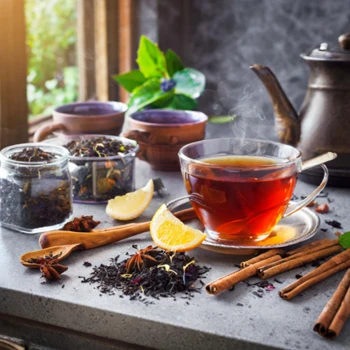
Black tea is best before a workout and also one of the best options for making a pre-workout drink.
The main reason for this is that it contains a reasonable amount of caffeine, which, according to the National Institute of Health (NIH), can have a very positive effect on training performance and mental focus [1].
More on the exact benefits shortly.
But there are also many herbal teas that have a positive impact on your body, overall health, and exercise routine.
The great thing is that when you know what types of tea work well, you can either create your own blend or simply ask for one that supports an active lifestyle in your health food store.
6 Best Teas for Workouts

Here are the teas you should consider before a workout.
1. Black Tea
Black tea seems to be the best pre-workout drink, based on all of our research.
First of all, it contains a good dose of caffeine that has been proven by NIH to have a positive effect on exercise performance, making it great for weight loss [2].
At the same time, the caffeine content is also low enough not to mess with your blood pressure too much.
And it’s also a rich source of polyphenols, which have been linked to muscle protection and endurance.
2. Green Tea
Green tea might have a bit of an acquired taste, but dietitians have been recommending it for a long time for general weight loss efforts.
According to NIH, it’s a known fat burner that can help you lose weight more efficiently [3]. At the same time, it has a very mild caffeine hit, making green tea suitable as a pre-workout in the evening.
Green tea is also full of antioxidants, and studies from NIH have shown that it can help reduce muscle damage during exercise [4].
All that adds up to the main reasons why so many pre-workouts contain green tea extract.
3. Oolong Tea
Oolong tea is a Chinese tea that is almost as popular as green tea and is consumed a lot more than pu-erh tea.
First of all, it has about a third of the caffeine as a cup of coffee, but still enough to have a positive effect on your training.
But Oolong tea also contains magnesium and potassium. These are important for two reasons.
According to ResearchGate, using magnesium before or after a workout plays a key role in muscle function during exercise and recovery times [5]. It’s the one thing you should take if you regularly get cramps in your muscles.
And potassium is an electrolyte that will help your body stay properly hydrated.
“Humans evolved on a high-potassium diet, full of plant foods, and our kidneys are well adapted to excrete excess intake of this mineral.”
- Donna P. Feldman, MS, RDN, Active.com.
4. Matcha Tea
Matcha tea is a great natural pre-workout alternative if you don’t like the flavor of green tea. I find it has a more subtle taste, and it’s quite nice to drink cold as well.
Like its green cousin, Matcha is full of antioxidants.
But what I found most interesting is that it also contains some L-theanine.
According to NIH, when this amino acid is combined with caffeine, it can provide a boost in brain function and mental alertness that might help with a mid-workout slump [6].
In addition to its rich antioxidant content, matcha tea contains a beneficial amino acid called L-theanine. This remarkable amino acid has been shown to promote relaxation and calmness while simultaneously improving mental focus and alertness.
By combining caffeine's natural energising effects with L-theanine's soothing properties, matcha tea offers an energizing and balanced boost that enhances productivity and concentration throughout the day.
5. Ginger Tea
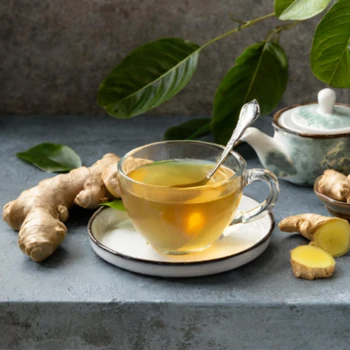
Ginger tea is known to have a very beneficial effect on the immune system, but what’s more interesting is that it can help with lowering inflammation in the body.
For athletes, that can have a very positive impact on muscles and joints that come under a lot of strain during high-energy workouts.
There’s also evidence from NIH that it helps with focus, which can help get you through training sessions and to your fitness goals faster [7].
6. Milk Tea
Drinking a pre-workout milk tea is another good option.
Some people have suggested that adding milk to black teas can have a negative effect, but a study from WebMed has shown that this isn’t true [8].
According to NIH, the benefit of having some milk tea comes through the added protein in milk that can help with muscle building [9]. It might only be a small amount, but it’s a completely natural protein as nature intended.
Don’t mistake this for white tea, which is a very specific type of unfermented tea leaf.
But keep in mind that milk isn’t that easy to digest and could cause stomach pain during training, especially on an empty stomach.
4 Benefits Of Drinking It Before Training

There are four main health benefits of drinking tea before workouts. And all gym goers can benefit from them.
1. Improved Hydration
Having a dedicated pre-workout drink is going to make a positive impact on your overall hydration levels before you start to do the heavy lifting.
According to a study from the FamilyDoctor, the generally accepted recommendation for pre-workout hydration is about eight ounces of water 30 minutes before you start your warm-up [10].
And when you drink tea as part of that habit, you can easily take care of most of that requirement.
And if you’re not a fan of hot drinks before training, then it’s very easy to make all the below recommendations into an iced tea.
2. Boosted Fat Burning
If your goal is weight loss and getting rid of some excess body fat, then caffeinated drinks are a great natural pre-workout.
Here’s why.
Many of the teas for weight loss that we recommend contain some caffeine. And this stimulant has been proven by NIH to trigger a metabolic process called thermogenesis [11].
This is a process where the body dials up your core temperature slightly, and it will burn fat in order to fuel that process.
It’s not like a get slim on the couch type effect. But it’s significant enough to make a difference over the months ahead.
3. Reduced Fatigue
When you’re heading into tough workout routines, one thing that will be on your mind is at what stage you’ll start to feel tired.
That’s when your mental strength becomes important to ignore the muscle aches and keep going.
The later that fatigue sets in, the more successful your workout will be.
There is evidence from ScienceDaily that drinking green tea on a regular basis can improve your endurance while also triggering fat loss [12].
4. Faster Recovery
Dealing with post-workout muscle recovery and muscle soreness by drinking tea was a new concept for me.
However, studies from the NIH have shown that catechins from tea leaves can positively impact muscle inflammation [13].
This is a natural chemical substance that you find in particularly high doses in green tea.
Now, you might have heard me shout, “No pain, no gain” at the gym a few times. But reducing inflammation doesn’t just have an impact on pain.
It can also help with post-workout muscle tissue repair, as vital nutrients should get into muscle fibers more easily.
How Much Should You Drink Before Training?
You should drink one to two cups of tea before training. This will give you the 8-12 ounces of water that is generally a good idea to bring your hydration levels up.
Now, you might want to be a bit more careful with black tea. It’s stronger than other teas when it comes to caffeine.
And while that’s positive for body fat, the caffeine could make you jittery or mess up your sleep if you exercise later in the day.
But in general, one cup of any type of tea is a great starting point.
Are There Teas You Should Avoid?

Yes, there are certain teas that you should avoid as a pre-workout option. Here are the three that I wouldn’t recommend.
Lavender Tea
This is not the best pre-workout drink, and I would go as far as saying that for most people, it’s not a good option during the day.
It’s commonly used in aromatherapy, but it’s also possible to drink it as tea.
This is generally recommended as part of a sleep routine in order to calm the body and mind.
I would say that this is one of the best teas to drink after an evening exercise, as there are numerous benefits to your body when you get better sleep.
Chamomile Tea
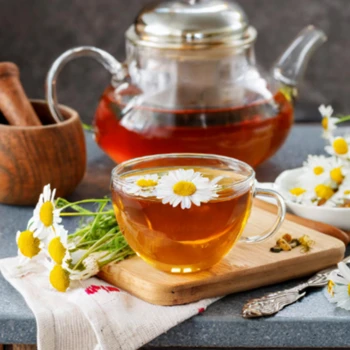
Studies from NIH have shown that chamomile extract and tea can have a calming effect that is almost like a sedative [14].
It’s one of the most common all-natural alternatives to sleeping tablets, and you’ll find it in many brands of nighttime tea.
And while having a better night’s sleep can help you better repair muscle damage from exercise, this is not a good effect to experience at the gym.
That’s a time when you want your mind to be sharp and focused.
Mint Teas
My grandmother always told me to have mint tea for stomach issues, and I still have a cup after large meals during bulking phases.
But there’s one thing that it’s missing.
As a naturally caffeine-free tea, you lose all the benefits that come from this stimulant. Yes, you can drink it any time of day, but there’s no scientific evidence that it will boost your performance.
There are better options listed above that can make a significant difference.
DIY Recipes for Creating Custom Pre-Workout Tea Blends
- Energy-Boosting Tea Blend
- Ingredients:
- 1 part green tea leaves (for natural caffeine and antioxidants)
- 1 part yerba mate (for a caffeine boost and increased mental clarity)
- ½ part ginger root (for its stimulating properties)
- A pinch of cayenne pepper (to kickstart metabolism)
- Preparation:
- Mix all ingredients in a bowl.
- Steep 1 teaspoon of the blend in hot water for 3-5 minutes.
- Strain and enjoy, preferably in the morning or before a workout.
- Ingredients:
- Focus Enhancement Tea Blend
- Ingredients:
- 1 part peppermint leaves (for mental alertness)
- 1 part ginkgo biloba leaves (known for improving cognitive function)
- ½ part rosemary leaves (for memory and concentration)
- ½ part lemongrass (for a refreshing and calming effect)
- Preparation:
- Combine all the herbs evenly.
- Use 1 teaspoon of the blend per cup of boiling water.
- Steep for 5-7 minutes, strain, and drink when you need a mental focus boost.
- Ingredients:
- Endurance Support Tea Blend
- Ingredients:
- 1 part rooibos tea (caffeine-free and rich in antioxidants)
- 1 part hibiscus flowers (for vitamin C and blood pressure regulation)
- ½ part beetroot powder (for stamina and blood flow)
- ¼ part licorice root (for sustained energy)
- Preparation:
- Mix all the ingredients thoroughly.
- Brew 1 teaspoon of the blend in hot water for 5-7 minutes.
- Strain and drink either hot or cold, ideal for pre or post-workout.
- Ingredients:
FAQs
How Soon Before a Workout Should You Drink Tea?
You should drink tea about 30 minutes before a workout.
This allows your body to absorb all the micronutrients, especially caffeine in black tea.
As a result, you’ll feel the full benefits during your workout and not before.
Is Green Tea a Good Pre Workout?
Yes, green tea is a good pre-workout due to its multiple health benefits such as increased metabolism, enhanced hydration, and mental regeneration.
References:
- https://pubmed.ncbi.nlm.nih.gov/33345139/
- https://pubmed.ncbi.nlm.nih.gov/34934054/
- https://pubmed.ncbi.nlm.nih.gov/10702779/
- https://pubmed.ncbi.nlm.nih.gov/29746891/
- https://www.researchgate.net/publication/232155233_Magnesium_and_Implications_on_Muscle_Function
- https://pubmed.ncbi.nlm.nih.gov/18681988/
- https://pubmed.ncbi.nlm.nih.gov/25049196/
- https://www.webmd.com/diet/default.htm
- https://www.ncbi.nlm.nih.gov/pmc/articles/PMC2569005
- https://familydoctor.org/athletes-the-importance-of-good-hydration/
- https://pubmed.ncbi.nlm.nih.gov/2912010/
- https://www.sciencedaily.com/releases/2005/01/050128221248.htm
- https://pubmed.ncbi.nlm.nih.gov/23470311/
- https://www.ncbi.nlm.nih.gov/pmc/articles/PMC5470311/
About The Author
You May Also Like
